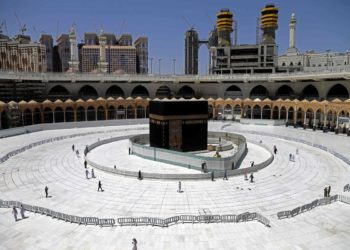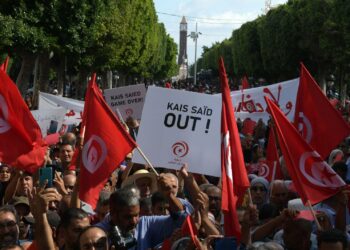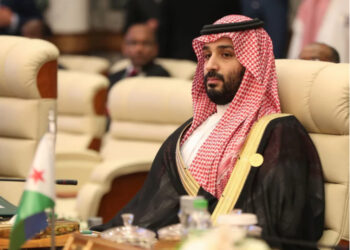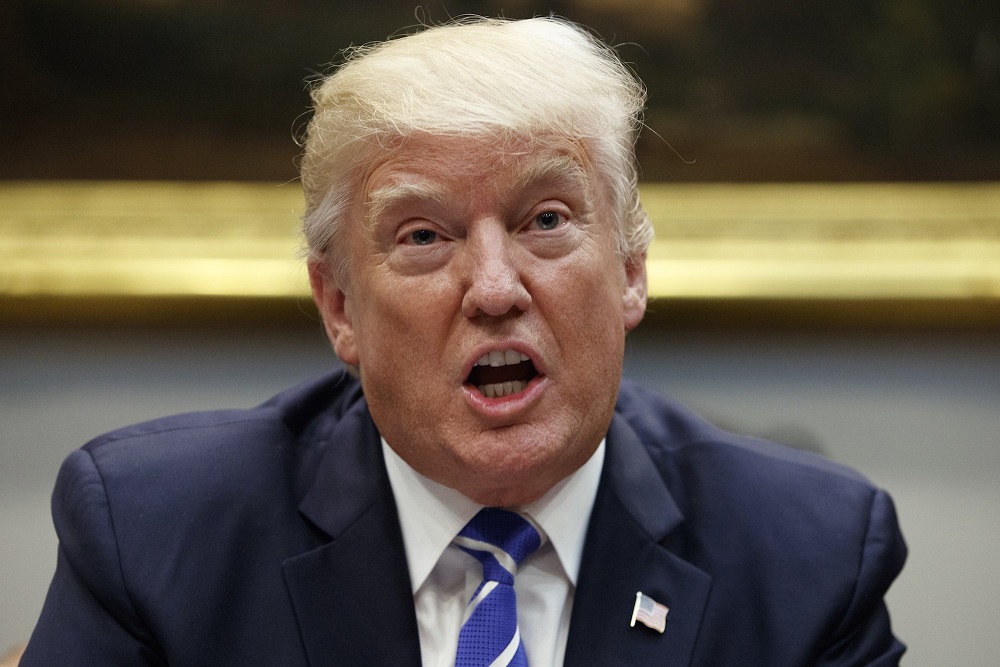The Qataris are not backing down: the small state on the northeastern coast of the Arabian Peninsula has been under blockade by its neighbors – Saudi Arabia, the United Arab Emirates, Bahrain and Egypt – for more than five months, but it is ready to stay under pressure virtually forever.
Despite attempts at negotiations, neither side seems ready to move forward toward a resolution of the conflict. Qatar has repeatedly said it would not bow to pressure and called its sovereignty a “red line.”
“We can live forever like this,” Qatar’s Foreign Minister Sheikh Mohammed bin Abdulrahman Al Thani said in June.
The blockade has slowly started to take its toll on the other Gulf Cooperation Council members. The bloc is scheduled to hold a summit in December, but the prospects of it taking place amid the crisis are becoming increasingly dim.
If the meeting is cancelled, it will be the first time since the GCC’s establishment in 1981 that its members were not able to overcome their disagreements to take part in the conference. However, if the annual meeting takes place, it could indicate that there is still hope for cooperation.
Fear of Riyadh’s Growing Influence
Qatari officials claim that the blockade was started to impinge on the country’s sovereignty. Qataris fear becoming a marionette of Saudi Arabia, which has already exerted its influence on some of the smaller Gulf countries. Saudi Arabia has maintained security in Bahrain since the 2011 uprisings and led the intervention in Yemen that has been blamed for deepening the humanitarian crisis there.
“The demands that are being made are incredibly unrealistic. No sovereign country would allow that degree of control over its foreign and domestic policy,” Abdullah Al-Arian, an assistant professor of History at Georgetown University’s School of Foreign Service in Qatar told The Globe Post.
Qatar has refused to meet 13 demands issued by Saudi Arabia and its allies at the beginning of the blockade. Doha was ordered to close the news network Al Jazeera, expel Turkish troops from Qatar, reduce diplomatic relations with Iran, and end support for extremist groups such as al-Qaeda, Islamic State, Hamas or the Muslim Brotherhood.
U.S. Base Gives Space to Resist
Qatar’s fear of Saudi influence is not new and is grounded in history. Saudi Arabia represented Qatar’s foreign policy until the early 1990s when Doha managed to develop its gas industry. Dr. Allen Fromherz, the director of the Middle East Studies Center at Georgia State University, told The Globe Post that there have been attempts to influence Qatar’s foreign policy in the recent past as well. For example, rumours were spread of coups against the then-emir Sheikh Hamad in the 2000s.
Nevertheless, the situation has escalated since 2014 when Saudi Arabia, the U.A.E. and Bahrain recalled their ambassadors from Qatar, accusing it of backing the former Egyptian president, Mohamed Morsi, who was a previously a member of the Muslim Brotherhood.
The presence of the U.S. military base in Qatar plays a role in preserving stability in the region. According to Paul Rivlin, a senior research fellow at the Moshe Dayan Center for Middle Eastern and African Studies in Tel Aviv, both Saudis and Qataris feel that the American presence gives Qataris a certain amount of license to resist Riyadh. Qatar hosts the largest U.S. military base in the Middle East, which is used for regional operations including airstrikes against ISIS.
Blockade Seen as a Matter of Jealousy
Traveling through Qatar it is not obvious that the country is going through one of the biggest challenges in its history. The only real reminder of the blockade are paintings of Emir Sheikh Tamim bin Hamad that can be seen everywhere: on skyscrapers, car windows or t-shirts. Qataris say that this painting has become a symbol of resistance against the pressure of the Gulf States and Saudi Arabia in particular.
Most of the country’s inhabitants, especially citizens who comprise only about 10 percent of the population, do not feel the direct impact of the blockade unless they have business relations with the other countries involved.
People in Qatar seem most worried about the image of the country, and many see it as a matter of jealousy, and understand that it has harmed the view of Qatar in the rest of the world.
Mr. Fromherz, who wrote “Qatar: A Modern History,” acknowledged that Doha’s neighbors have become concerned with the level of success it has maintained in the region.
“Beyond its history of the Muslim Brotherhood and other issues, it is a matter of wanting to claim a new balance of power in the region and seeing Qatar’s not immediate concession to Saudi interests as a threat,” Mr. Fromherz said.
Proxy Conflict Between Saudi Arabia and Iran
Some experts believe that the blockade is primarily concerned about Qatar’s relations with Iran. Mr. Rivlin told The Globe Post that Saudi Arabia in particular is anxious about the Iranian presence in Yemen, Syria and Lebanon. By demanding Qatar reduces its relations with Iran, Saudi Arabia seeks to reduce its growing influence in the region.
Qatar and Iran share one of the largest natural gas field in the world, which run across the waterline between them. Thus, cooperation in the gas field naturally serves them both in developing closer diplomatic relations. According to Mr. Fromherz, unlike other Gulf countries, Qatar has decided to maintain channels of communication with Iran with the idea of balancing the influence of its powerful neighbors.
To this extent, Qatar is not following the common policy line of the GCC. Contrary to Saudi Arabia or the U.A.E., Doha refrains from criticism towards Iran’s foreign or domestic policies. Qatar was the last GCC member state to condemn last year’s terrorist attacks on Saudi diplomatic mission in Iran and was the last to withdraw its ambassador from Tehran.
Unintended Consequences
The blockade has also brought unintended consequences. Mr. Arian said that the blockade could push Qatar even closer to Iran, especially if it becomes a question of status quo.
However, it is not only about politics. The blockade has also become a test of Qatar’s economic power. Countries that initiated the embargo have cut off trade and any transport links with Qatar, so it has been essential for Doha to find new sources of import, especially for food, 90 percent of which is imported. Most imports were previously brought over the land border with Saudi Arabia, but Qatar has had to redirect trade routes through other countries, mostly relying on Iran.
Seeking to alleviate the negative impact of the embargo, a new $7.4 billion port along the Gulf coast was opened in September. The Hamad port now allows Qatar to import products directly from countries such as China and Oman. That means that Qatar will be able to continue the development of its infrastructure, which is necessary for FIFA 2022 World Cup.
Vague End of the Crisis
This diplomatic crisis in the Gulf is unprecedented. Even though Kuwait has taken on the responsibility to mediate the conflict, it will be difficult to bring both parties together. According to Mr. Rivlin, this conflict brings so much confusion because “it is a very Middle Eastern kind of dispute between the egos of the leaders.”
Mr. Fromherz believes though that if the blockade is lifted it will leave Qatar in a more stronger position politically. However, he agrees that if the blockade continues, it may push Qatar away from the Gulf countries and serve to potentially undermine some of the interests of the entire GCC.
As the blockade had continued for nearly five months, some experts question the future of the GCC and its ability to survive the diplomatic crisis. If Qatar does not participate in next month’s summit, it could indicate that the organization “will become a means of furthering the Crown Prince of Saudi’s agenda in the region,” Mr. Fromherz said.
On the other hand, if the summit goes ahead as planned and Qatar participates, it would show that the bloc is ready to sit down and eventually find a way out of the crisis. Mr. Arian doubts that the GCC could recover to the degree to which it has worked in the past – with one synchronised policy and one outlook on all major issues affecting the region. He believes that the GCC is likely to become more a symbolic organization and its member states eventually might be headed to different directions.






















